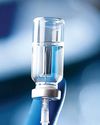Prøve GULL - Gratis
Biomarkers in Kidney Health: Enhancing Early Detection and Treatments
BioSpectrum Asia
|BioSpectrum Asia May 2025
Emerging biomarkers such as neutrophil gelatinase-associated lipocalin (NGAL) and kidney injury molecule-1 (KIM-1) have shown great potential in the early diagnosis of kidney injury. These biomarkers are extremely sensitive indicators of tubular injury, and they can detect renal damage at stages when conventional markers are still within normal ranges. While these novel biomarkers have high sensitivity and specificity, incorporating them into ordinary clinical practice raises several problems. Despite its potential, more study is needed to validate these biomarkers in large-scale, long-term clinical studies.

Doctors rely on assessing kidney function to diagnose and manage kidney disease. For years, medical professionals have used traditional indicators such as serum creatinine, blood urea nitrogen (BUN), and the calculated estimated glomerular filtration rate (eGFR) to check and track kidney health. These tests are widely accessible and useful for monitoring the gradual loss of kidney function. However, they have a significant limitation: they often fail to detect problems until substantial kidney damage has already occurred. This is particularly concerning in glomerular diseases, where early damage may go unnoticed until the kidneys are severely impaired.
For patients at high risk of kidney problems—such as those with diabetes, high blood pressure, or a family history of kidney disease—the urinary microalbumin-to-creatinine ratio has become an important tool. This measurement can detect early kidney damage, even when blood creatinine levels appear normal by identifying small increases in albumin excretion in the urine. Early detection allows doctors to begin treatment sooner, potentially slowing the progression of chronic kidney disease (CKD) and reducing the risk of cardiovascular complications.
Cystatin C, a low molecular weight protein produced by all nucleated cells, has also gained attention as a biomarker for kidney function that may be more accurate than creatinine. Unlike creatinine, cystatin C levels are less influenced by factors such as muscle mass, age, or diet. This makes it especially valuable in populations where serum creatinine may be unreliable, such as the elderly or individuals with low muscle mass. Despite its advantages, cystatin C has yet to become a routine part of clinical practice due to higher testing costs, variability in laboratory measurements, and the lack of standardised reference ranges.
Denne historien er fra BioSpectrum Asia May 2025-utgaven av BioSpectrum Asia.
Abonner på Magzter GOLD for å få tilgang til tusenvis av kuraterte premiumhistorier og over 9000 magasiner og aviser.
Allerede abonnent? Logg på
FLERE HISTORIER FRA BioSpectrum Asia

BioSpectrum Asia
Waters launches charge detection mass spectrometry technology
US-based Waters Corporation has unveiled the Waters Xevo Charge Detection Mass Spectrometer (CDMS), delivering unmatched measurement and characterisation for the broadest range of mega-mass biomolecules central to next-generation therapeutics and structural biology.
1 min
BioSpectrum Asia Nov 2025

BioSpectrum Asia
Chulalongkorn University launches Thailand's first master's programme in Nurse Anesthesia
The Faculty of Nursing, Chulalongkorn University, has officially launched the \"Master of Nursing Science Programme in Nurse Anesthesia\" - the first of its kind in Thailand.
1 min
BioSpectrum Asia Nov 2025

BioSpectrum Asia
WHO strengthens coordination for NTD programmes and supply chain delivery
The World Health Organization (WHO), together with health ministries, pharmaceutical donours, implementing partners and technical support platforms, is strengthening coordination for neglected tropical disease (NTD) programmes and supply chain delivery, through three major back-to-back meetings in Geneva.
1 min
BioSpectrum Asia Nov 2025

BioSpectrum Asia
All-in-one coronavirus vaccines to save millions in future pandemics
A new study reveals that vaccines designed to protect against a wide range of coronaviruses could dramatically reduce deaths and economic disruption and limit the need for lockdowns in the event of another global coronavirus pandemic.
1 min
BioSpectrum Asia Nov 2025
BioSpectrum Asia
NTU in Singapore introduces Master of Science course in Chinese Medicine
From 2026, Nanyang Technological University (NTU) in Singapore will start offering a Master of Science in Chinese Medicine to develop highly skilled postgraduates with advanced expertise in both the theoretical foundations and practical applications of Chinese medicine.
1 min
BioSpectrum Asia Nov 2025

BioSpectrum Asia
ProSpecBio launches Activin-A recombinant protein for brain injury research
Israel-based ProSpecBio, an evolving biotech company dedicated to providing highly purified proteins to the global research community, has announced the launch of its latest product: CHO cell-derived recombinant Activin-A, now available for immediate delivery worldwide.
1 min
BioSpectrum Asia Nov 2025

BioSpectrum Asia
PAHO publishes guide for designing AI instructions in public health
The Pan American Health Organization (PAHO) has launched a new guide providing practical advice on how to create Artificial Intelligence (AI) prompts that generate reliable, relevant, and culturally appropriate content across diverse contexts.
1 min
BioSpectrum Asia Nov 2025

BioSpectrum Asia
Prerna launches India's first MicroRNA based blood test for breast cancer screening
Precision RNA Biotech (Prerna), a healthcare startup from Hyderabad, India has announced the launch of Cantel, India's first microRNA-based blood test for breast cancer screening.
1 min
BioSpectrum Asia Nov 2025

BioSpectrum Asia
Poly Medicure announces acquisition of Citieffe Group for Rs 324 Cr
India-based medtech firm Poly Medicure has announced signing of a definitive agreement to acquire 100 per cent stake in Medistream SA (Group) consisting of Citieffe SRL and its step-down subsidiaries in USA & Mexico, at an Enterprise Value of Rs 324 crore (EUR 31 million).
1 min
BioSpectrum Asia Nov 2025

BioSpectrum Asia
Sumitomo, Novo Nordisk to co-promote obesity drug Wegovy in Japan
Sumitomo Pharma and Novo Nordisk Pharma have entered into a co-promotion agreement in Japan for Wegovy Subcutaneous Injection, a once-weekly subcutaneous injection formulation of GLP-1 receptor agonist indicated for the treatment of obesity disease.
1 min
BioSpectrum Asia Nov 2025
Listen
Translate
Change font size
